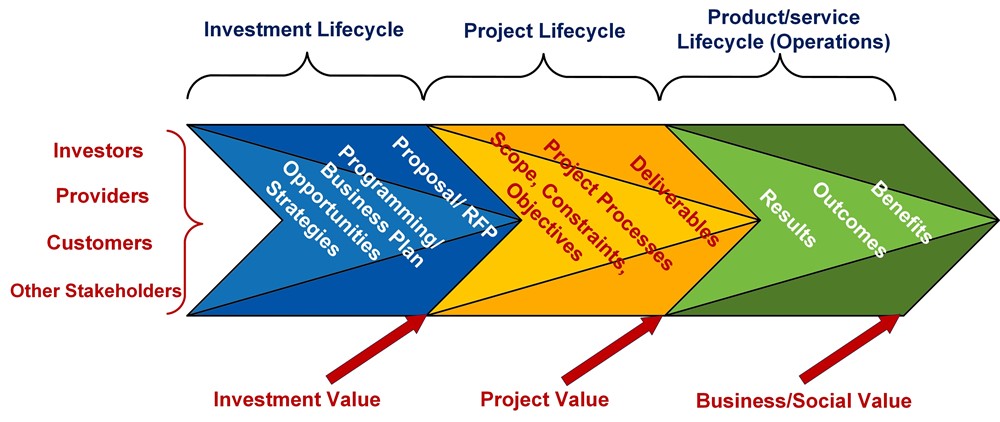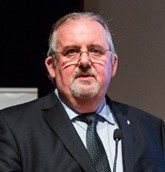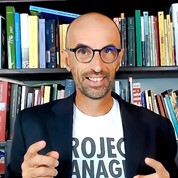The scalability of systemic approach
to improve project strategic alignment
FEATURED PAPER
By Marco Caressa and Massimo Pirozzi
Rome, Italy
ABSTRACT
In each organization, the alignment of the projects with the strategies is essential in order to deliver the desired value to the diverse stakeholders, and, ultimately, to achieve the project success itself. Since every organization may be assimilated to a portfolio, project strategic alignment requires running successfully not only project management, but also higher-level management perspectives, including program and portfolio management. Therefore, an eventual scalability of project management tools and techniques to program and portfolio domains might greatly extend and strengthen the possibility of their effective and efficient management. This paper shows how the systemic approach may ensure the project scalability, not only in the commonly used top-down WBS-based approach towards subprojects and work packages, but also in the bottom-up approach towards programs and portfolios.
THE PROCESS OF VALUE CREATION IN THE ORGANIZATIONS
We can assume that project management has two primary objectives (Archibald and Archibald, 2016), i.e. all projects have to be aligned with the organization’s strategies, and each project has to achieve its objectives and to produce the desired value. These principles perfectly correspond to the fact that projects are primarily operational means to achieve strategic goals via the creation and the delivery of value, so that, accordingly, their importance is mainly perceived by the stakeholders – and, specifically, by the customers and the investors – as strategical.
Indeed, the “instrumental nature” of the projects is already evident in the first statement of PMBOK (Project Management Institute, 1987), which reports that “establishing a project as a means to an end has been around since man’s early history”. In the project management standards, this principle has been reaffirmed “projects are a means of achieving organizational goals and objectives. This is often accomplished in the context of a strategic plan that is the primary factor guiding investments in projects” (Project management Institute, 2017), and has been presently confirmed too “projects can be a means to achieving strategic objectives” (International Organization for Standardization, 2020).
However, above project instrumental nature is not evidently clear and/or accepted in a substantial number of cases, since for the last ten years the number of projects that did not satisfy the original goals/business intents has been, on average, always higher than 30% (Project Management Institute, 2018 and 2021). It seems that a significant number of project managers, teams and executives are still closely tied to a pure plan-based, project requirements-centered approach, which corresponds to a project management view of an execution/delivery only discipline, while the development and delivery view has greater potential to add value (Stretton, 2022). The pure plan-based approach, in fact, does not take into considerations properly both the stakeholder expectations, and, ultimately, the need of managing complexity and achieving the success: it may be interesting to notice that, coincidentally but perhaps not too much, more than 30% of organizations are still not centered on delivering customer value … (Project Management Institute, 2021).
Definitively, the alignment of the projects with each organization’s strategy that is involved, and the effective delivery of a business and/or social value in accordance with diverse stakeholder expectations become critical success factors in the organizations.
If we consider the whole process of value creation and delivery – from the definition of the strategies to the achievement of benefits – and we use the approximation that all involved processes have a linear behavior (while in fact they are context-sensitive and may be iterative/adaptive), in the resulting value chain we may distinguish three main phases, which basically correspond to the initial investment life cycle, to the project lifecycle and to the product/service lifecycle (Fig.1).

Fig.1 – A Project Value Chain (Source: Caressa and Pirozzi, 2022)
These three phases are usually sequential, although partial overlapping may occur in specific agile/adaptive scenarios. In any case, the processes that are part of each lifecycle may iterate, and therefore a structured approach to track them – as project management is – becomes a priority (Caressa and Pirozzi, 2022). For example:
More…
To read entire paper, click here
How to cite this paper: Caressa, M and Pirozzi, M (2022). Project, Program and Portfolio Management: the scalability of systemic approach to improve project strategic alignment; PM World Journal, Vol. XI, Issue XII, December. Available online at https://pmworldlibrary.net/wp-content/uploads/2022/11/pmwj124-Dec2022-Caressa-Pirozzi-Project-Program-and-Portfolio-Management-scalability.pdf
About the Authors

Massimo Pirozzi
Rome, Italy
![]()
Massimo Pirozzi, MSc cum laude, Electronic Engineering, University of Rome “La Sapienza”, Principal Consultant, Project Manager, and Educator. He is a Member of the Executive Board and an Accredited Master Teacher, of the Istituto Italiano di Project Management (Italian Institute of Project Management). He is certified as a Professional Project Manager, as an Information Security Management Systems Lead Auditor, and as an International Mediator. He is a Researcher, a Lecturer, and an Author about Stakeholder Management, Relationship Management, and Complex Projects Management, and his papers have been published in U.S.A., in Italy, and also in Russia; in particular, he is the Author of the innovative Book “The Stakeholder Perspective: Relationship Management to enhance Project value and Success”, CRC Press, Taylor & Francis Group, Boca Raton (FL), U.S.A., October 2019. Due to the acknowledgement of his comments on stakeholder-related issues contained in Exposure Draft of The Standard for Project Management – 7th Edition, he has been recognized as one of the Contributors and Reviewers of The PMBOK® Guide – Seventh Edition, and he received the Certificate of Appreciation for Excellence for his volunteer contributions to the Project Management Institute and the project management profession in 2020.
Massimo Pirozzi has a wide experience in managing large and complex projects, programs, and portfolios in national and international contexts, and in managing business relations with public and private organizations, including multinational companies, small and medium-sized enterprises, research institutes, and non-profit organizations. He worked successfully in several sectors, including Defense, Security, Health, Education, Engineering, Logistics, Cultural Heritage, Transport, Gaming, Services to Citizens, Consulting, and Web. He was also, for many years, a Top Manager in ICT Industry, and an Adjunct Professor in Organizational Psychology. He is registered as an Expert both of the European Commission, and of Italian Public Administrations.
Massimo Pirozzi is an Accomplished Author and an International Editorial Advisor of PM World Journal. He received three 2020 PM World Journal Editor’s Choice Awards for his featured paper “Project Management for Evidence Based Medicine” (co-authored with Dr. Lidia Strigari), for his Article “Project communications 1.0 and 2.0: from information to interactivity” and for his report from Italy titled “The fight against Coronavirus disease (COVID-19) from the perspectives of projects and of project management”. He received also two 2019 PM World Journal Editor’s Choice Awards for his featured paper “Stakeholders, Who Are They?”, and for his report from Italy titled “PM Expo® and PM Maturity Model ISIPM-Prado®”, and a 2018 PM World Journal Editor’s Choice Award for his featured paper “The Stakeholder Management Perspective to Increase the Success Rate of Complex Projects”.
Massimo can be contacted at max.pirozzi@gmail.com.

Marco Caressa
Rome, Italy
![]()
Marco Caressa, MSc cum laude, Nuclear Engineering, University of Rome “La Sapienza”, IT Manager, Project & Program Manager, Consultant and Trainer. He is certified as a Professional Project Manager according to the UNI 11648 and UNI 11506 Italian standards, compliant with the ISO 21500 “Guidance on Project Management”.
Marco Caressa has more than 25 years of experience in software coding and design, enterprise and digital systems architecture, big data, research and management for Engineering Ingegneria Informatica SpA. He has extensive experience in managing large and complex digital business transformation projects and programs.
Currently, he deals with supply engineering through the proposition of digital solutions and innovative technologies in different market areas, including Engineering, Public Sector, Industry, Insurance & Finance. PMP®, PMI-ACP® , PRINCE2 Practitioner, Scrum Master, enthusiast of traditional and agile Project Management. Blogger and columnist for trade and web magazine, trainer, mentor and coach. He is active on social networks, for 3 years with his LinkedIn page and for 1 year with a YouTube channel he has been working as a popularizer of managerial disciplines.
Marco Caressa has intervened in various training events, webinars (PMI, Project Management Institute; ISIPM, Istituto Italiano di Project Management) and as keynote speaker at conferences, including the last two editions of PMExpo, the largest Italian event on Project Management, organized and promoted by ISIPM (Istituto Italiano di Project Management).
Marco Caressa has collaborated as a professor of Project Management for several Italian universities, including:
– Master in Project Management (LUISS, Libera Università degli Studi Sociali di Roma)
– Second Level Master in Data Science (University of Perugia)
– Course of planning and management of European funds (University of Rome Tor Vergata)
– First level Master “Industry 4.0” (University of Pisa)
– First level Master “Scalability: digital technologies and company growth” (University of Pisa, Scuola Superiore S. Anna of Pisa)
Marco can be contacted at: marco.caressa@pm.me or through his LinkedIn page (https://www.linkedin.com/in/marcocaressa/) or his YouTube channel https://www.youtube.com/c/MarcoCaressa









